In the world of high-fidelity music streaming, two names stand above the rest: Qobuz and Tidal. Both promise to deliver your favorite music in stunning, lossless quality, far surpassing the standard offerings of Spotify or Apple Music. But as the line between them blurs with new features and pricing, choosing the right service has become more challenging than ever. Are you looking for the purest audiophile experience, or a feature-packed, modern media hub?
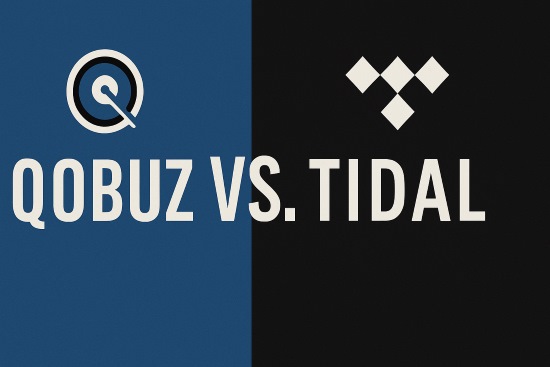
If you're struggling to decide where to invest your subscription, you've come to the right place. This in-depth comparison will break down every critical aspect of the Qobuz vs Tidal debate. We'll dive deep into sound quality, pricing, music libraries, and unique features to help you make a confident choice that perfectly fits your listening style.
Part 1. At a Glance: Qobuz vs Tidal Comparison Table
For a quick overview, here's how the two high-resolution giants stack up against each other in the most important categories.
| Feature | Qobuz | Tidal |
|---|---|---|
| Max Streaming Quality | 24-bit / 192kHz FLAC | 24-bit / 192kHz FLAC |
| Spatial Audio | No | Yes (Dolby Atmos & Sony 360 Reality Audio) |
| Individual Plan Price | $12.99 / month | $10.99 / month |
| Music Library Size | 100+ million tracks | 110+ million tracks |
| Video Content | No | Yes (650,000+ music videos, exclusives) |
| Unique Feature | Integrated Hi-Res Download Store | Immersive Spatial Audio & Video Content |
| Best For | Audiophile Purists & Music Collectors | Modern All-Rounders & Feature Seekers |
Part 2. Qobuz vs Tidal: Sound Quality and Audio Formats
For anyone considering these services, sound quality is paramount. For years, this was a complex debate involving different technologies, but in 2025, the landscape has simplified significantly.
The End of MQA: Tidal's Full Transition to Hi-Res FLAC
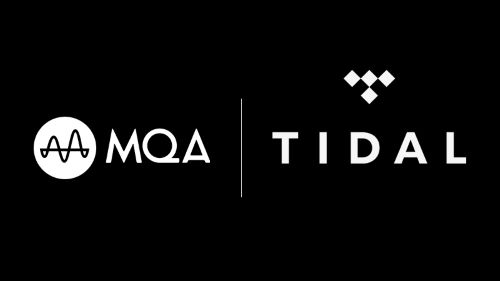
Previously, Tidal's high-resolution audio was delivered using MQA (Master Quality Authenticated) technology. While innovative, MQA was a controversial, lossy format that drew criticism from parts of the audiophile community. In a major win for consumers, Tidal has officially phased out MQA and now delivers its entire Hi-Res catalog in the universally praised FLAC format—the same format Qobuz has always used. This means both services now offer pristine, lossless audio up to a stunning 24-bit/192kHz resolution.
Does Qobuz Still Sound Better? The Audiophile Verdict
With both platforms using FLAC, are they sonically identical? Not quite. In blind tests and discussions among dedicated audiophiles, Qobuz often maintains a slight edge. Many listeners with high-end equipment describe the sound from Qobuz as being a touch more "open", "natural", or "detailed". This is likely due to Qobuz's meticulous sourcing of masters, positioning itself as a service for the most discerning ears. For most people listening on headphones or consumer-grade speakers, however, this subtle difference will be imperceptible.
The Game-Changer: Tidal's Dolby Atmos vs. Qobuz's Stereo Purity
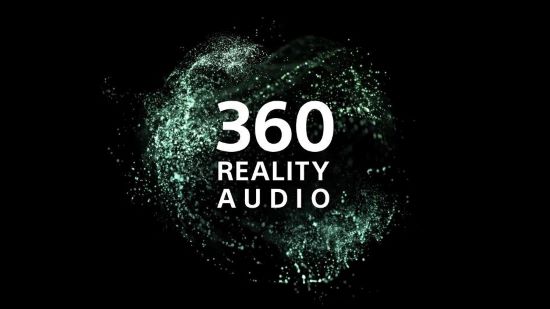
The biggest difference in audio today is Tidal's trump card: Spatial Audio. Tidal boasts a massive and growing library of tracks mixed in Dolby Atmos and Sony 360 Reality Audio. This technology creates an immersive, three-dimensional soundscape that surrounds you with music. It's a transformative experience that Qobuz, which focuses exclusively on the highest quality stereo playback, does not offer.
Winner: It's a tie, depending on your priority. For the purest two-channel stereo experience, Qobuz holds a slight edge. For a modern, immersive audio experience with cutting-edge formats, Tidal is the undisputed winner.
Part 3. Tidal vs Qobuz: Pricing and Value Compared
Your wallet is a key factor in any subscription decision. Here, a recent shift has made the choice much clearer.
Tidal's All-in-One Plan: The New Value King?
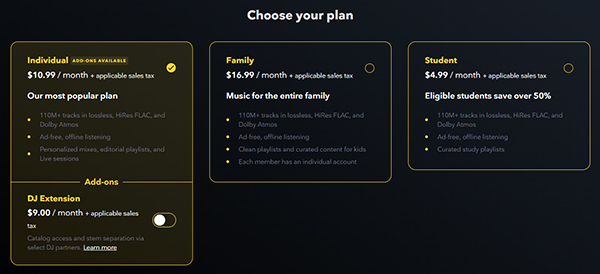
Tidal has simplified its pricing into a single, highly competitive tier. For just $10.99 per month, the standard Tidal Individual plan gives you access to everything: the entire 110+ million track library in lossless CD quality, Hi-Res FLAC, and all spatial audio formats. This aggressive pricing makes top-tier audio more accessible than ever before.
Qobuz Studio vs. Sublime: Is the Download Discount Worth It?
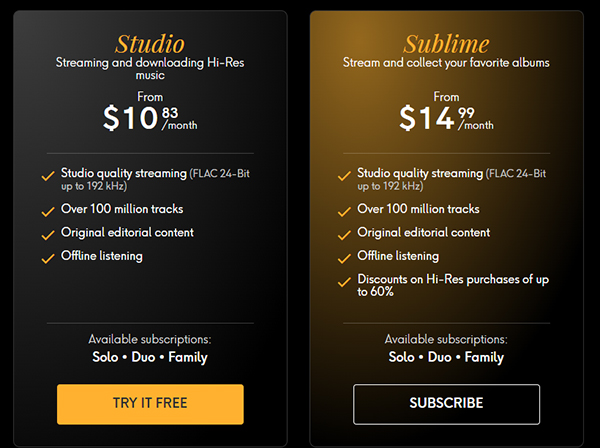
Qobuz's standard streaming plan, "Studio", costs $12.99 per month (or less if you pay annually). For this, you get unlimited access to their Hi-Res streaming catalog. Qobuz also offers a "Sublime" tier, which is paid annually and provides significant discounts (up to 60% off) on music purchases from their integrated Hi-Res Download Store.
Winner: Which Service Offers More for Your Money?
For the average streamer, Tidal offers better value. It's cheaper month-to-month and includes the expensive-to-produce spatial audio content at no extra charge. However, if you are a music collector who wants to own your music, the discounts offered by the Qobuz Sublime plan could save you a significant amount of money in the long run.
Part 4. Music Library & Catalog: A Tidal vs Qobuz Deep Dive
A streaming service is nothing without the music you want to hear. While both catalogs are enormous, their focus and curation philosophies are quite different.
Catalog Size: A Battle of Millions
On paper, both services are evenly matched, with Qobuz offering over 100 million tracks and Tidal slightly more at 110 million. You are highly unlikely to find a major mainstream release missing from either platform. The real difference is in the depth of their catalogs and the content that surrounds the music.
For the Connoisseur: Qobuz's Edge in Classical and Jazz
Qobuz has built its reputation on being a service for music lovers, by music lovers. Its catalog is particularly strong in classical and jazz, often featuring extensive discographies and rare recordings. More importantly, Qobuz provides a rich editorial context, including digital booklets, detailed album reviews, artist biographies, and over 500,000 articles that dive deep into the music. It feels less like an app and more like a digital record store with an expert staff.
Beyond the Music: Tidal's Dominance in Music Videos and Exclusives
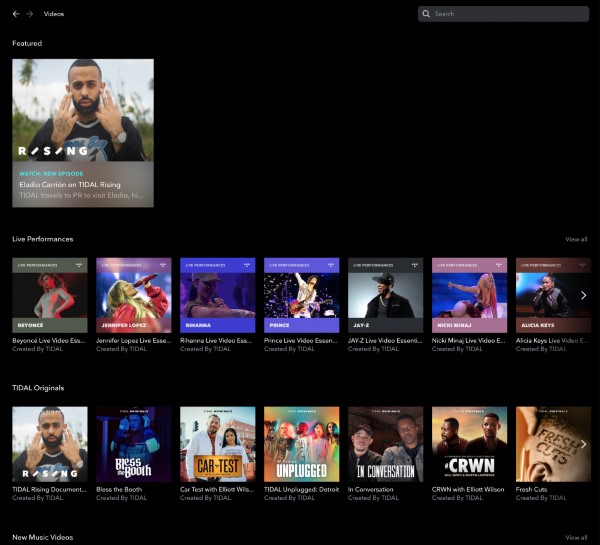
Tidal positions itself as a complete cultural and media hub. Its library includes over 650,000 music videos, exclusive artist interviews, documentaries, and behind-the-scenes content. If you enjoy the visual aspect of music and want to engage with artists on a deeper level, Tidal's offering is unmatched.
Winner: Again, it depends on what you're looking for. For a curated, educational experience focused purely on the music, Qobuz wins. For a broader media experience with videos and exclusive content, Tidal is the clear choice.
Part 5. Features, Apps, and Device Compatibility
How you interact with your music every day is crucial. A great app and seamless connectivity can make all the difference.
Music Discovery: Human Curation (Qobuz) vs. Smart Algorithms (Tidal)
Tidal's music discovery engine works much like Spotify's, using algorithms to generate personalized playlists like "My Mixes" and "Daily Discovery". It's excellent at surfacing new music based on your listening habits. Qobuz takes a different approach, relying on human-curated playlists and its deep editorial content to guide your discovery, which can lead to more intentional and rewarding finds.
Connectivity: Tidal Connect vs. Qobuz Connect
Both services offer a "Connect" feature that allows you to control playback on compatible Hi-Fi devices directly from the app. However, Tidal Connect is more mature and supported by a significantly wider range of audio brands. Tidal also has broader app support on smart TVs and other streaming devices where Qobuz is absent.
App Experience and Ecosystem Support
Generally, users find the Tidal app to be more polished, modern, and responsive. The Qobuz app is functional and clean but can feel more basic in comparison. Both services are fully integrated into the popular audiophile software Roon, making them excellent choices for users with dedicated Hi-Fi setups.
Winner: With a slicker app, better algorithmic discovery, and wider device support, Tidal takes the win for overall features and user experience.
Part 6. The Final Verdict: Which Hi-Fi Service Is Right for You?
After breaking it all down, the choice between Qobuz and Tidal isn't about which is "better", but which is better for you. They serve two different types of listeners.
Choose Tidal If... You're the Modern All-Rounder
You want a single app that does it all: incredible sound quality, a massive library of mainstream music, algorithm-driven playlists that find new hits for you, and cutting-edge features like Dolby Atmos. You love music videos and want to listen on every device you own, from your phone to your smart TV. For you, Tidal's combination of features, polish, and affordable price is unbeatable.
Choose Qobuz If... You're the Audiophile Purist
You prioritize sound quality above all else. Your goal is to replicate the experience of listening to a studio master on a high-end stereo system. You love to read liner notes, learn the history behind an album, and discover new music through expert recommendations, not algorithms. You may also want to purchase and permanently own your favorite albums. For you, Qobuz's commitment to audio purity and rich editorial content is a perfect match.
Part 7. Bonus: Own Your Music from Qobuz or Tidal Forever
No matter which service you choose, you're still just renting access to the music. If you ever cancel your subscription, your library disappears. If you want true ownership and the freedom to play your high-resolution music on any device, anytime, without needing an internet connection, the best solution is to download it.
For this, a tool like DRmare Streaming Audio Recorder is the perfect companion to your Qobuz or Tidal subscription. Unlike its name suggests, it's not a real-time recorder but a powerful, high-speed converter. It allows you to download any song, album, or playlist from either service and convert it into a standard audio file (like FLAC or MP3) on your computer. It perfectly preserves the lossless audio quality and all the original song information, including cover art, artist, and album titles.
Step-by-Step Guide to Use DRmare Streaming Audio Recoder
- Step 1Set Your Output Format and Preferences
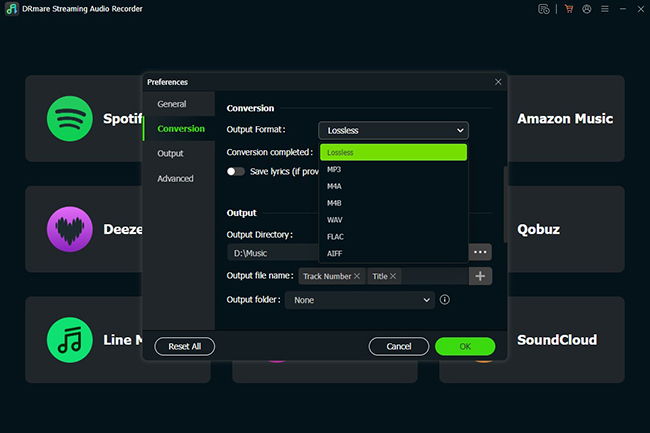
Before you begin, launch the DRmare software and open the "Preferences" menu. Here, you can select your desired output format for the downloaded music. For the best quality, choose a lossless format like FLAC. You can also customize audio parameters such as bitrate, sample rate, and how your files will be organized.
- Step 2Select a Streaming Service and Add Music
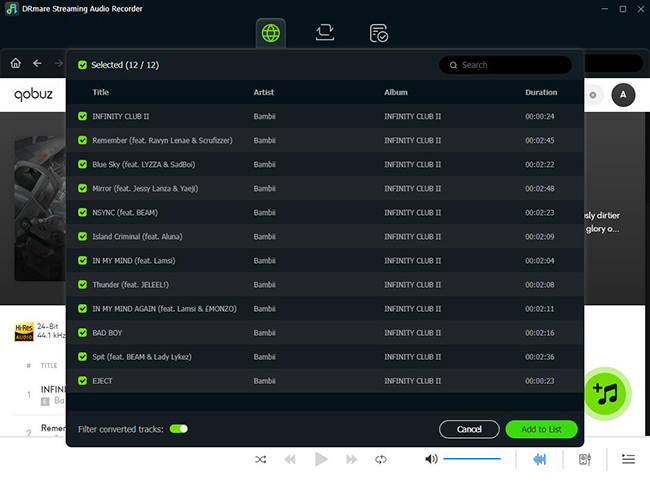
From the main screen, choose the streaming music platform you want to download from, such as Tidal or Qobuz. The software's built-in browser will open, prompting you to log in to your account. Once logged in, navigate to any album, playlist, or track you want to save. Click the "Add" button to load the songs, and then click "Add to List" to place them in your conversion queue.
- Step 3Download and Convert Your Music
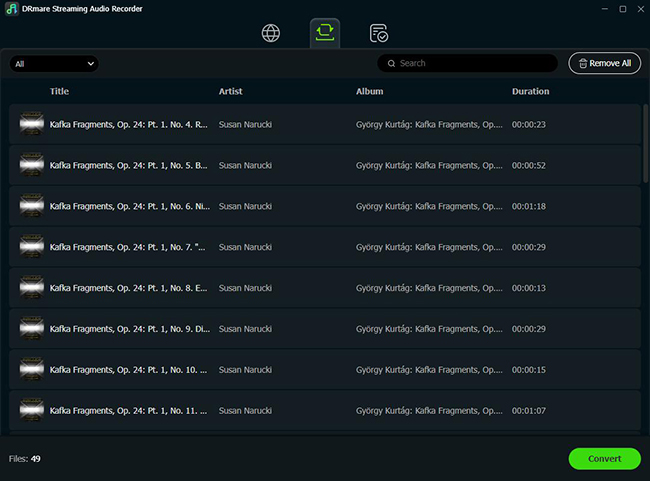
Navigate to the "Converting" tab to see all the tracks you've added. When you're ready, click the "Convert" button at the bottom. The software will automatically download and convert the songs to your chosen format, saving them as local files on your computer. You can find your finished, DRM-free music library in the "Converted" tab, ready for offline playback on any device.
Part 8. FAQs about Tidal vs. Qobuz
Does Qobuz pay artists more than Tidal?
Yes. Both services pay artists well above the industry average, but Qobuz is consistently cited as having one of the highest per-stream payout rates, making it a top choice for those looking to support artists directly.
Is the difference in sound quality betwenn Tidal and Qobuz really noticeable?
On high-end audio equipment (like dedicated amplifiers and audiophile-grade headphones or speakers), discerning listeners may notice a slight edge in clarity and detail on Qobuz. On most consumer devices like laptops, Bluetooth speakers, or standard earbuds, the difference is negligible.
Can I transfer my playlists from Spotify or Apple Music to Qobuz or Tidal?
Yes! Both Qobuz and Tidal support third-party services like Soundiiz or TuneMyMusic that allow you to easily transfer your existing playlists and library from other streaming platforms.













User Comments
Leave a Comment